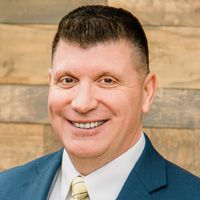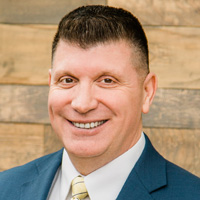To Create a Happy Retirement, Start With the Three Ps
What's your financial 'philosophy' for your golden years? Is your retirement 'planning' specific to you? What's your 'process' to design your dream retirement?


Profit and prosper with the best of Kiplinger's advice on investing, taxes, retirement, personal finance and much more. Delivered daily. Enter your email in the box and click Sign Me Up.
You are now subscribed
Your newsletter sign-up was successful
Want to add more newsletters?

Delivered daily
Kiplinger Today
Profit and prosper with the best of Kiplinger's advice on investing, taxes, retirement, personal finance and much more delivered daily. Smart money moves start here.

Sent five days a week
Kiplinger A Step Ahead
Get practical help to make better financial decisions in your everyday life, from spending to savings on top deals.

Delivered daily
Kiplinger Closing Bell
Get today's biggest financial and investing headlines delivered to your inbox every day the U.S. stock market is open.

Sent twice a week
Kiplinger Adviser Intel
Financial pros across the country share best practices and fresh tactics to preserve and grow your wealth.

Delivered weekly
Kiplinger Tax Tips
Trim your federal and state tax bills with practical tax-planning and tax-cutting strategies.

Sent twice a week
Kiplinger Retirement Tips
Your twice-a-week guide to planning and enjoying a financially secure and richly rewarding retirement

Sent bimonthly.
Kiplinger Adviser Angle
Insights for advisers, wealth managers and other financial professionals.

Sent twice a week
Kiplinger Investing Weekly
Your twice-a-week roundup of promising stocks, funds, companies and industries you should consider, ones you should avoid, and why.

Sent weekly for six weeks
Kiplinger Invest for Retirement
Your step-by-step six-part series on how to invest for retirement, from devising a successful strategy to exactly which investments to choose.
As you near your retirement years, dreams of the daily freedoms and the life to come can certainly take over. Watching grandchildren grow, traveling the world, finding new hobbies or just enjoying days without schedules are just a few things that can excite us about life in the years ahead.
However, the uncertainty of the world we live in can distract us from dreams of a happy retirement. We fear that our visions may never be realized because of barriers such as continued volatility in the markets, lack of clarity surrounding future interest rates, inflation that we continue to see in our daily lives or even the social and geopolitical events of the day.
For those preparing for or already in retirement, these concerns are real. You work hard for many years and begin dreaming of the possibilities for this next phase of life, all while watching things around us happen without much clarity or certainty. Not knowing how the events of today will positively or negatively impact retirement can be a significant source of stress and worry for those not properly prepared.
It’s more important than ever, while you dream of the freedom and independence that retirement could bring, you start with and understand three things as you begin properly preparing for this journey. I call them the three P’s of your retirement: philosophy, planning and process. Consider these as a starting point as you prepare your dream retirement blueprint:

Philosophy
Take time to reflect and understand your own philosophy about what your financial life will be about during those golden years. If you’ve been a diligent saver and good steward with money, will life just be about having an uncoordinated basket of investment or insurance products that you hope will grow enough to last long into the future? Will you continue to have an investment-only focus, where happiness in retirement will be dependent primarily on positive market returns?
Compare that to having a mindset focused on retirement strategies such as preservation, distribution and coordination. Don’t get trapped into a belief that your investments, no matter how much you have saved, are a retirement plan. Make sure your philosophy is about being comprehensive and holistic when considering all areas of your financial life.

Planning
No matter what, the planning you do should be retirement “specific” and “customized” to you. Do not settle for using generic retirement rules and outdated advice. Realize that accumulating your wealth is significantly different than preserving and distributing your wealth. Many areas of your financial life should go from being set on “autopilot” to taking a more active and focused approach. Understand, you are going from “earning a living” to “creating a retirement,” both of which will require a very different mindset and sets of strategies.
Something as popular as the 4% rule, which came to be in the early 1990s as a suggestion for the best way to make your money last throughout retirement, may not apply to you when it comes to creating retirement income.
Other common considerations and decisions that need to be customized to you and not generic are things such as:
- When to begin Social Security benefits.
- Selecting your pension elections.
- Roth conversions and tax strategies.
- Properly using financial tools, such as annuities and life insurance for income or estate planning purposes.
- Establishing an estate plan that accounts for many of the “what-ifs” in life.
Too many considerations about retirement to list here should be customized and specific to give you the best opportunity to live the retirement you want to live.

Process
Now that you have begun to shift your mindset from one of “accumulation” to that of “distribution and preservation,” it’s time to determine what your process (or your financial adviser’s process) will be to implement retirement strategies that will help mitigate various types of financial risks as we age.
Designing your retirement “blueprint” should not feel overwhelming, complicated or confusing. Trying to design and implement strategies for all areas of our retirement, such as income, tax, health care and estate planning, can be intimidating and cause us to avoid having the right conversations. Quite often, it leads us back to focusing only on those things we feel comfortable with, such as our investment accounts and fixating on the market.
The process for creating your plan should be systematic, go step by step, brick by brick, addressing each of these areas one at a time. This will seem so much less intimidating and increase the likelihood you will keep your focus on having a comprehensive, holistic and coordinated retirement.
Determining who will help guide you through this maze of decisions and strategies will be one of the most important considerations you will have. Do you take on this responsibility yourself or seek the guidance of advisers who specialize in retirement preparation? Understand, financial advisers, just like doctors, can either be more general in their services and serve a wide range of clients, or they can be more focused and specialize in retirement planning. Do your research and understand what you need and what you want.
As the world we live in continues to feel out of control, take a deep breath, a few steps back and focus on these three P’s for an amazing retirement!
Investment Advisory Services offered through Trek Financial LLC., an (SEC) Registered Investment Advisor. Information presented is for educational purposes only. It should not be considered specific investment advice, does not take into consideration your specific situation, and does not intend to make an offer or solicitation for the sale or purchase of any securities or investment strategies. Investments involve risk and are not guaranteed, and past performance is no guarantee of future results. For specific tax advice on any strategy, consult with a qualified tax professional before implementing any strategy discussed herein. Trek 23-600
This article was written by and presents the views of our contributing adviser, not the Kiplinger editorial staff. You can check adviser records with the SEC or with FINRA.
Profit and prosper with the best of Kiplinger's advice on investing, taxes, retirement, personal finance and much more. Delivered daily. Enter your email in the box and click Sign Me Up.

Nicholas Toman, CFP®, is a lead retirement planner and investment adviser with Empowered Financial Management, a firm that specializes in retirement planning for those individuals within five to seven years of retirement or who have recently retired and no longer wish to serve as their own financial adviser. Nicholas is a graduate of the University of Wisconsin-Whitewater with a BBA in accounting and has been a Certified Financial Planner since 2014.
-
 5 Vince Lombardi Quotes Retirees Should Live By
5 Vince Lombardi Quotes Retirees Should Live ByThe iconic football coach's philosophy can help retirees win at the game of life.
-
 The $200,000 Olympic 'Pension' is a Retirement Game-Changer for Team USA
The $200,000 Olympic 'Pension' is a Retirement Game-Changer for Team USAThe donation by financier Ross Stevens is meant to be a "retirement program" for Team USA Olympic and Paralympic athletes.
-
 10 Cheapest Places to Live in Colorado
10 Cheapest Places to Live in ColoradoProperty Tax Looking for a cozy cabin near the slopes? These Colorado counties combine reasonable house prices with the state's lowest property tax bills.
-
 Don't Bury Your Kids in Taxes: How to Position Your Investments to Help Create More Wealth for Them
Don't Bury Your Kids in Taxes: How to Position Your Investments to Help Create More Wealth for ThemTo minimize your heirs' tax burden, focus on aligning your investment account types and assets with your estate plan, and pay attention to the impact of RMDs.
-
 Are You 'Too Old' to Benefit From an Annuity?
Are You 'Too Old' to Benefit From an Annuity?Probably not, even if you're in your 70s or 80s, but it depends on your circumstances and the kind of annuity you're considering.
-
 In Your 50s and Seeing Retirement in the Distance? What You Do Now Can Make a Significant Impact
In Your 50s and Seeing Retirement in the Distance? What You Do Now Can Make a Significant ImpactThis is the perfect time to assess whether your retirement planning is on track and determine what steps you need to take if it's not.
-
 Your Retirement Isn't Set in Stone, But It Can Be a Work of Art
Your Retirement Isn't Set in Stone, But It Can Be a Work of ArtSetting and forgetting your retirement plan will make it hard to cope with life's challenges. Instead, consider redrawing and refining your plan as you go.
-
 The Bear Market Protocol: 3 Strategies to Consider in a Down Market
The Bear Market Protocol: 3 Strategies to Consider in a Down MarketThe Bear Market Protocol: 3 Strategies for a Down Market From buying the dip to strategic Roth conversions, there are several ways to use a bear market to your advantage — once you get over the fear factor.
-
 For the 2% Club, the Guardrails Approach and the 4% Rule Do Not Work: Here's What Works Instead
For the 2% Club, the Guardrails Approach and the 4% Rule Do Not Work: Here's What Works InsteadFor retirees with a pension, traditional withdrawal rules could be too restrictive. You need a tailored income plan that is much more flexible and realistic.
-
 Retiring Next Year? Now Is the Time to Start Designing What Your Retirement Will Look Like
Retiring Next Year? Now Is the Time to Start Designing What Your Retirement Will Look LikeThis is when you should be shifting your focus from growing your portfolio to designing an income and tax strategy that aligns your resources with your purpose.
-
 I'm a Financial Planner: This Layered Approach for Your Retirement Money Can Help Lower Your Stress
I'm a Financial Planner: This Layered Approach for Your Retirement Money Can Help Lower Your StressTo be confident about retirement, consider building a safety net by dividing assets into distinct layers and establishing a regular review process. Here's how.
